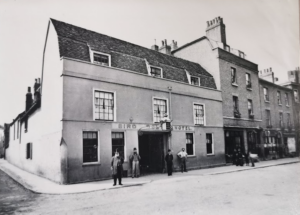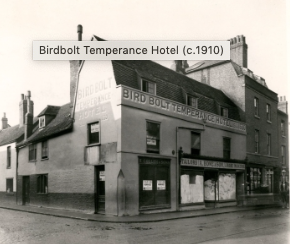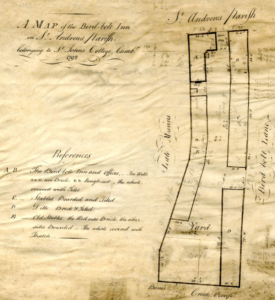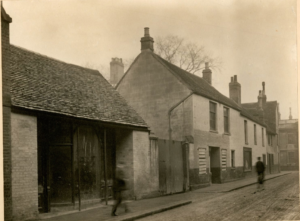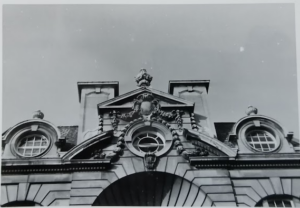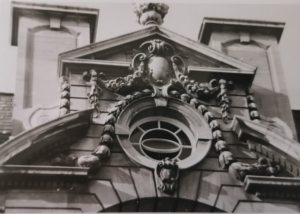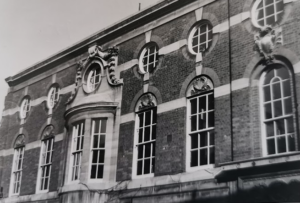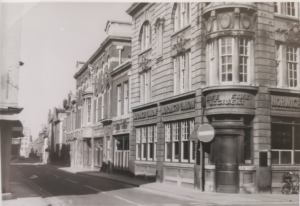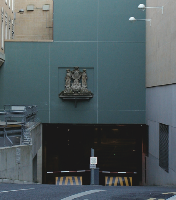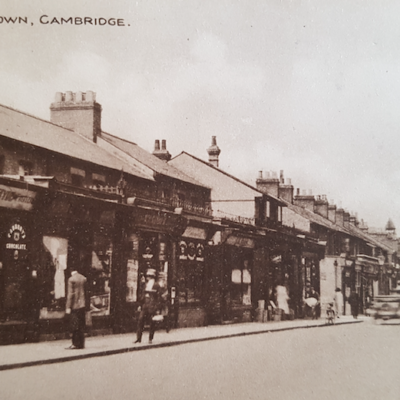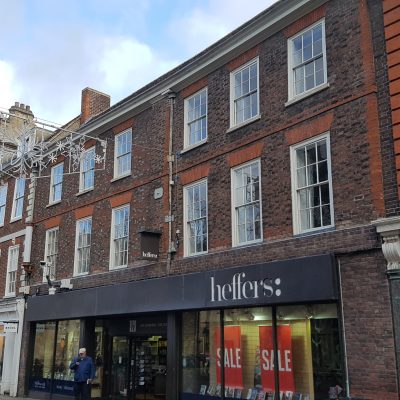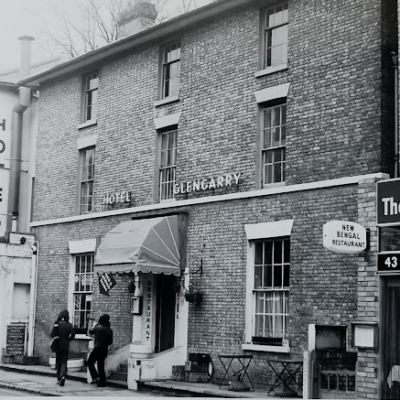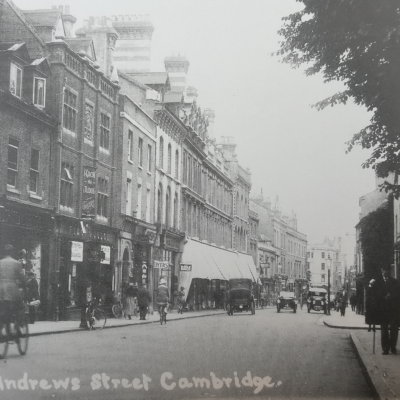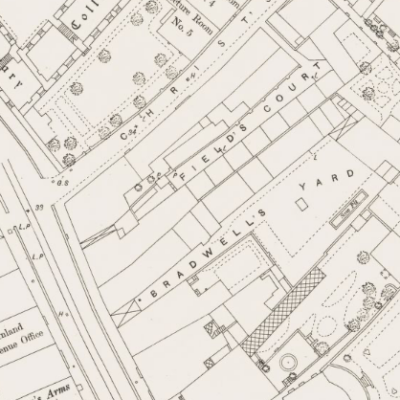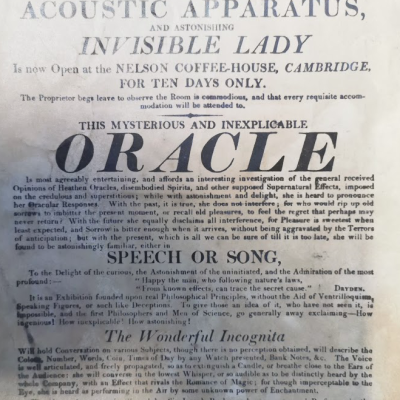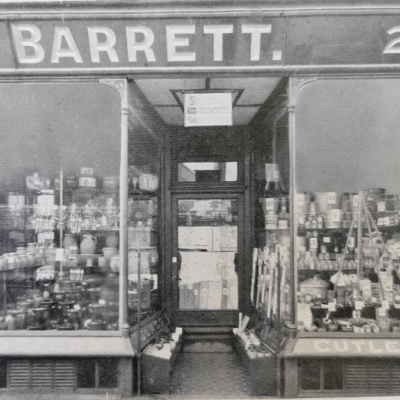Search by topic
- archaeology
- Building of Local Interest
- charity
- church
- crime
- dressmaker
- fire
- Great Eastern Railway
- Listed building
- Mapping Relief
- medieval
- oral history
- poverty
- Public House
- Rattee & Kett
- Religious House
- Roman
- scholar
- school
- Then and Now
- tudor
- women
- work
- world war one
- world war two
Search by text
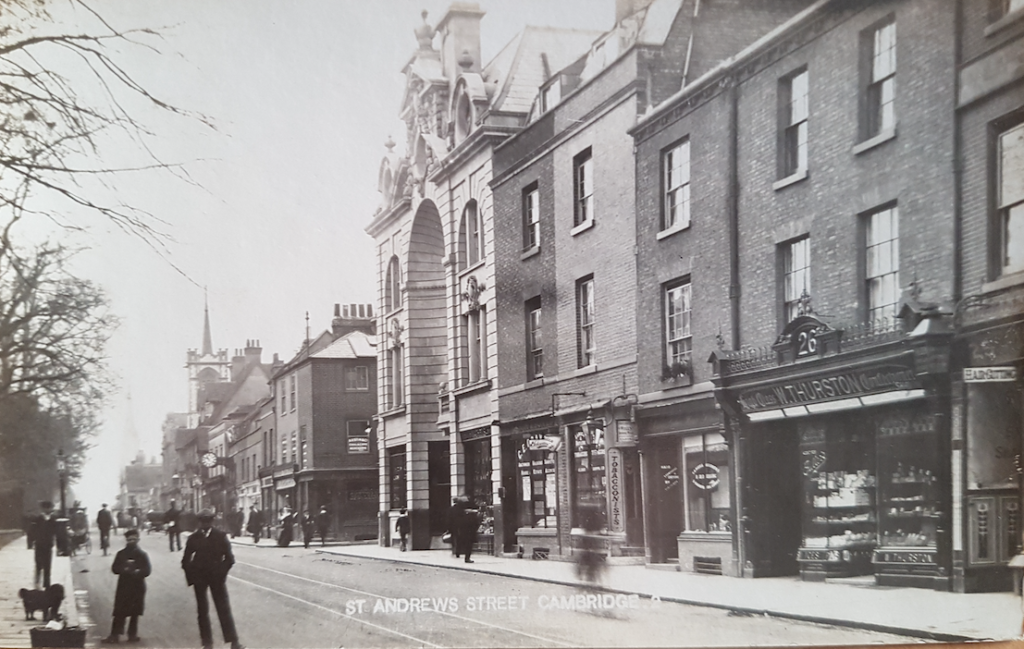 St Andrew's Street nos 26 - 30
St Andrew's Street nos 26 - 3030 St Andrew’s Street / Bird Bolt Inn / Norwich Union Chambers
History of 30 St Andrew's Street
According to Outside the Barnwell Gate (1915), this was the site of the celebrated medieval inn, the Bird Bolt. Indeed, Downing Street had previously been known as Bird-Bolt Lane. It was then in the possession of St John’s Hospital and it passed into the hands of the college of the same name.
A bird bolt was a bird trap, as might have been used on nearby fields. Elsewhere it is noted that the original name was ‘The Hanging Burbolt’ or the Burbolt. In c.1440 a brydbolt or burdebolt was a kind of blunt-headed arrow used for shooting birds.
The Grand Arcade archaeological excavation (see 2019 report p.253) produced a number of C18th archaeological finds at this site. Their report also illustrates the English tin-glazed earthernware sherds from plates marked Pink at the Birdbolt produced for the landlord Jonathan Pink found in 1905.
The Grand Arcade report (2019) noted with regard to C19th remains at the site:
The Birdbolt Inn at Plot XX continued to develop as a coaching inn for much of the nineteenth century. By 1881 it had become a temperance hotel, but this ceased trading in 1898; bringing to an end a 420-year tradition as an inn. The plot was then briefly occupied by a tailors and robemakers and several other businesses. The only archaeological feature was a particularly deep brick-lined well, Well 58, which was presumably linked to the large quantities of water that the inn required, particularly for the numbers of horses that the stables on the site suggest.
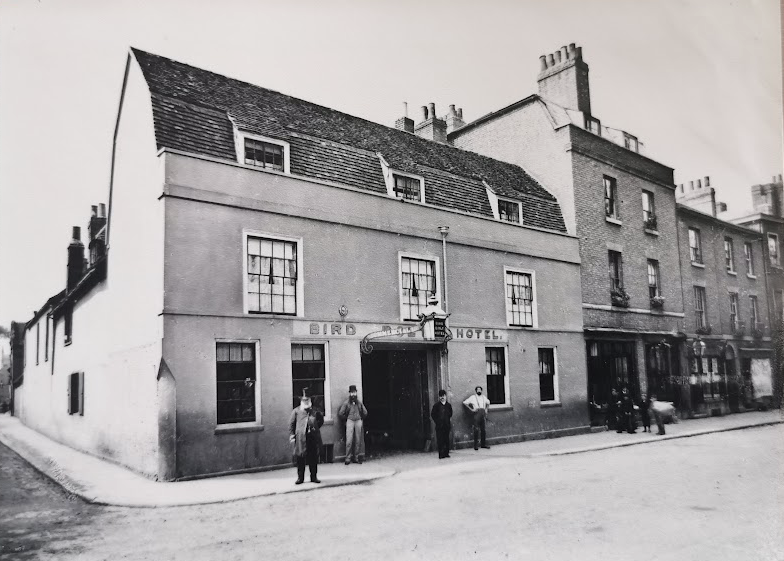
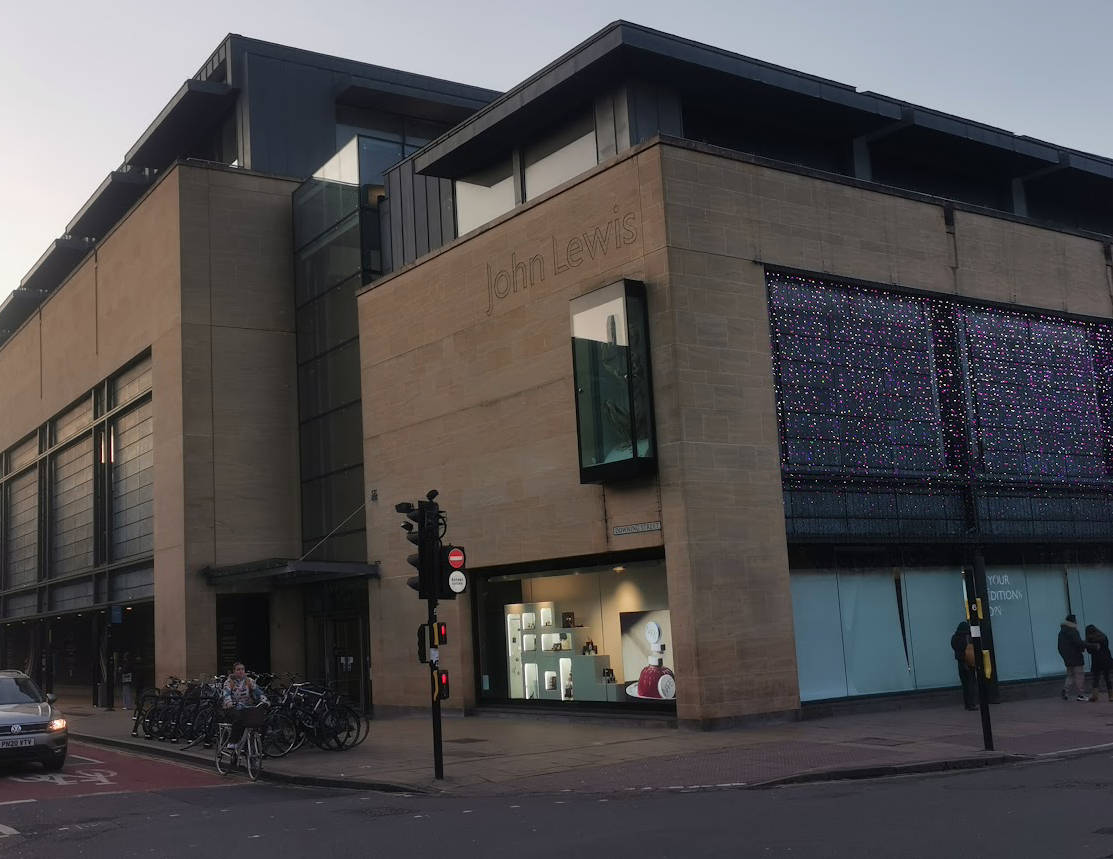
For more information se the page on the St John’s College website:
https://www.joh.cam.ac.uk/bird-bolt-inn-pub-temperance-hotel
The building was demolished circa 1900 and the business moved to 41 Regent Street.
1539 William Badcocke granted tenement
1577 lease granted to Jo Redayne of the Burbolt. Mr Redman was a well-known Esquire-Bedell (1563-c.1579) who had many financial and commercial dealings.
1596 lease granted to William Munnes, yeoman, of the Burbolt.
1609 lease to William Scarlett, stationer, of the Burbolte – he was a well-known Cambridge stationer.
1631 licence granted by the Vice-Chancellor of ‘The Hanging Burbolt, in St Andrew’s Parish, an Inn.’ This was to Henry Butts, the Master of Corpus who, having acted so heroically during the long plague in Cambridge, committed suicide on easter Day 1632.
The Wikipedia entry on Corpus Christi College records: The next notable Master was Henry Butts, who was also Vice Chancellor of the University. When the plague returned to the city and the rest of the University had fled, Butts stayed at his post and tried to limit the pestilence while staying alone in the college. He was unrewarded for his bravery and this experience seems to have had a terrible effect on him. In 1632, when Butts failed to turn up to deliver the University Sermon on Easter Day, he was found to have hanged himself.
A Short History of Corpus Christi (2013) revised O. Rackham says:
The next notable Master was Henry Butts, winner of a hung election in 1626 (after his opponent had thought he had elected himself by his own casting vote). He is remembered as the author of Diets Drie Dinner, a spoof herbal and parody of herbalists’ claptrap. He was an overworked man in Cambridge’s nastiest period, especially when as Vice-Chancellor he had the job of organizing a visit by the new and touchy King Charles I.
Dr Butts came to a premature and tragic end. In 1630, when he was still Vice-Chancellor, plague struck Cambridge yet again. Almost everyone who could ran away (as people did when there was plague), but Butts stayed resolutely at his post and worked with the town authorities to try to limit the pestilence and to organize supplies and relief for the vast numbers of unemployed. In a sad letter to Lord Coventry he describes how he himself was ‘alone, a destitute and forsaken man; not a Scholler with me in the college, not a Scholler seen by me without. God all-sufficient (I trust) is with me’. This dangerous and heroic task went unrewarded and unthanked. Butts was subjected next year to mean intrigue and criticism (Cambridge at its worst) over the postponed royal visit. His mind gave way; he thought God had deserted him; and on Easter Day 1632, failing to turn up for the University Sermon which he was to preach, he was found hanged in his garters from the lintel of a door in the Master’s Lodge.
1821 Richard Foster, lessee
1830 Thomas Lee (Pigot’s Directory)
1839 Thomas Lee (Pigot’s)
1842 Thomas Lee, (London Gazette, 4 March 1842)
1842 William Stewart, ostler, (London Gazette, 4 March 1842)
1843 Alfred William Farrall, innkeeper, licensed to let Horses and Gigs & Livery Stable-keeper, (London Gazette, 9 February 1849)
1851
Henry Davies, 40, hotel keeper, b Bucks
Ros, 37, b Kent
Henry M, 5, b Cambridge
Pauline G L, 3, b Cambridge
William Edward, 1 m., b Cambridge
Mary Ann Mansfield, visitor, 38, b Cambridge
Sarah Litchfield, 49, nurse, b Cambridge
Eliza Kifford, 23, chamber maid, b Pampisford
Rebecca Rawlinson, 15, nursemaid, b Pampisford
James Smith, 17, boots, b Herts
1852 Henry Davis (Slaters)
1859 James Flack, tenant (Records of Thompsons Lane Brewery)
1861
James Flack, inn keeper, 50, b London
Martha Flack, 48, b Cambridge
Caroline Flack, sister, 47, b Ware
Elizabeth Thurbon, cook, 34, b Cambridge
Mary Ann Saunders, waitress, 24, b Stansted
Mary Ann Loft, housemaid, 20, b Newmarket
William F Stallden, boots, 28, b Great Thetford
Barnet Beales (tailor of 42 Sidney Street) was also the leaseholder for the Bird Bolt Inn from St Johns College, the owner property. He paid one pound, ten per year for the forty-year lease from 1861-1906. The lease (available online) lists no increase over the term. There were no restrictions to what Beales charged the publicans and innkeepers who operated the Bird Bolt business (an inn for lodgers, restaurant, bar, stables, and entertainment venue). Business operators of the Bird Bolt, beholding to Beales, frequently changed with some declaring bankruptcy.
1867 P E Gray (Mathieson’s)
1869 Philip Edward Gray (Post Office Directory)
1871
Philip E Gray, hotel keeper, 37, b Thrapston
Harriett Gray, 38, b Cambridge
Philip H Gray, 10, b Cambridge
Emily J Gray, 9, b Cambridge
Ellen H Gray, 8, b Cambridge
Dora E Gray, 4, b Cambridge
Percy C Gray, 7 ms, b Cambridge
John W Gray, brother, commercial leather trader, 38, b Thrapston
Harriet Turpin, barmaid, 29, Huntingdonshire
Henry Marriott, assistant, 22, Lymington Hunts [?]
Rosa C Dance, governess, 19, b Bootle
Mary A Sanders, waitress, 24, b Stanstead
Ann Chapman, housemaid, 25, b Dallingham
Mary Croft, cook, 20, b Greenfield
Kate Holmes, scullerymaid, 20, b Fulbourn
Anne Bangs, nursemaid, 13, b Cambridge
John F Knights, boots, 21, b Mellis Suffolk
William G Osborne, visitor, Lord, 35, b Cambs
Thomas Fogg, visitor, chemicals & manure commercial, 37, b London
1875 Philip E Gray (Kelly’s)
1876 Philip Edward Gray, innkeeper bankrupt (London Gazette, 5 December 1876)
1879 Robert William Cole (Post Office Directory)
1881 30 St Andrew Street, Bird Bolt Hotel
Joseph Winship, hotel keeper, 44, b Grassby Lincoln
Louisa Winship, 37, Nayland Suffolk
Joseph Winship, 3, b Cambridge
Alfred J Winship, 6 months, b Cambridge
Anna L Numm, waitress (Inn, 31, Upleaden Gloucester
Susanah Cole, cook, widow, 52, b Wellington Somerset
Anne Marsh, nursemaid, 18, b Bottisham
Clara Bignall, nursemaid, 18, b Cambridge
Walter Chapman, boots, 22, b Quy
Arthur Cope, boarder, commercial traveller, 28, b Wolverhampton
Thomas Tar Handy, boarder, commercial traveller,28, b Sheffield
1882 Robert William Cole, hotel keeper (London Gazette, 27 October 1882 )
1891
Joseph Winship, hotel keeper auctioneer etc, 54, b Lincolnshire
Louisa Winship, 47, b Suffolk
Joseph Winship, 13, b Cambridge
Alfred G Winship, 10, b Cambridge
Mary Briggs, cook, 41, b Northamptonshire
Annie Poole, hotel waitress, 38, b Chelsea
George Howard, boots, 30, b Carlton
Ada Pierce, domestic servant, 26, b Hackney
Emma Rawlinson, domestic servant, 26, b Suffolk
Thomas Samuels, waiter, 22, b Cambridge
Ada Fuller, domestic servant, 16, b Little Wilbraham
Lawrence J Mitchell, lodger, commercial traveller, 37, b Ireland
Frederick J C Linton, lodger, civil engineer, 50, b Edinburgh
In 1901 Joseph Winship Snr is an Auctioneer, with wife and Joseph Jnr at 2 Regent Street. The address 29 and 30 St Andrews Street is shown on the 1901 census page so was probably vacant
1904
Bird Bolt demolished and offices of Norwich Union Insurance Office and Liberal Club constructed with deep foundations and limited archaeological investigation.
1911 (Norwich Union Chambers)
Harry House, 49, lodging house keeper, b Somerset
Minnie, 37, b Cambridge
Violet Doris Minnie, 6, b Norfolk
Dennis Charles, 4, b Norfolk
Clara Agnes Worboys, 22, housemaid lodging house, b Abington Piggotts
John Edleston ledsam Whitehead, boarder, 58, solicitor, b Cambridge
George Livingstone Lawrie Walker, 40, manager general warehouse, b Derbyshire
1913
(30) Mather and Son, jewellers
(30a) Norwich Union Fire Insurance Society
1937
(30) Mathers and Sons, watch makers
(30) Norwich Union Chambers
Norwich Union Fire
Pearl Assurance
Crafts Shoe Co
Spalding and Myers, architects
1962
Cambridge & District Co-Op
(30a) Norwich Union Insurance
(30a) Osborn Frank Bertie
1973
Buildings demolished and replaced with Norwich Union House in 1975.
Contribute
Do you have any information about the people or places in this article? If so, then please let us know using the Contact page or by emailing capturingcambridge@
License
This work is licensed under CC BY-NC-SA 4.0






